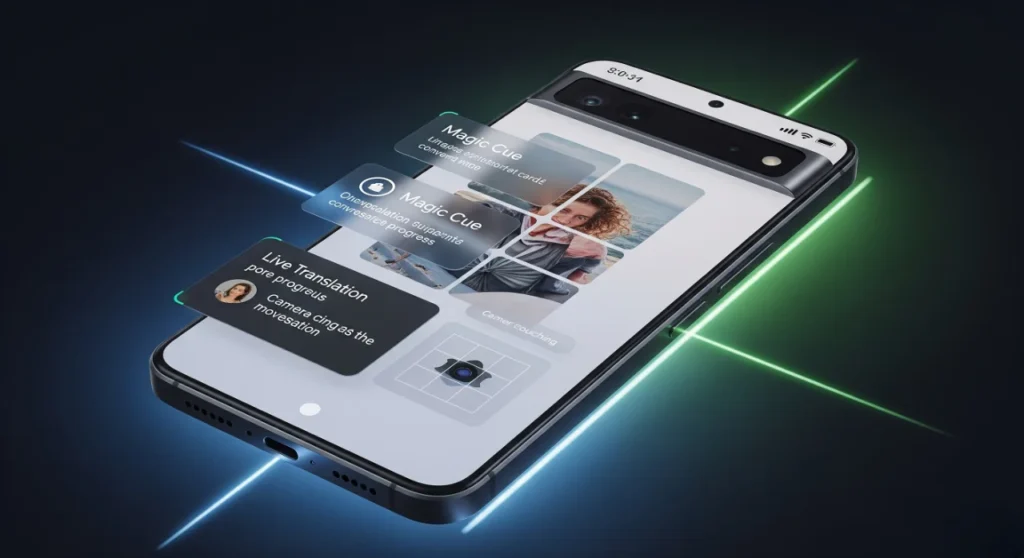Google’s Pixel 10 launch wasn’t really about the phone.
It was about AI — and how Google plans to put Gemini into billions of hands worldwide, turning every Android device into a gateway for its next big play against OpenAI and Perplexity.
Key Takeaways
- Google uses Pixel 10 to showcase Gemini-powered AI features.
- Strategy targets billions of Android users, not Pixel buyers.
- Analysts say Google leapfrogs OpenAI with global distribution.
- Apple’s slow AI rollout gives Google a rare window of advantage.
- Unanswered question: how will Google monetise Gemini at scale?
Google’s Pixel 10 launch focused less on hardware and more on Gemini AI features, from live call translation to AI camera coaching. Analysts say Google is leveraging Android’s 3B-device footprint to challenge OpenAI and Perplexity, raising the stakes in consumer AI adoption.
Pixel 10 Launch: A Trojan Horse for AI
When Google unveiled its Pixel 10 series this week, the headlines should have been about the sleek new phones. Instead, the real story was the AI software inside. Powered by Google’s Gemini models, Pixel 10 debuts “Magic Cue,” “Camera Coach,” and real-time call translation — features designed less to sell phones, and more to showcase Google’s AI ambitions.
Ben Wood, chief analyst at CCS Insight, put it bluntly: “The smartphone is the most pervasive consumer device on the planet. Google now has an opportunity to get people hooked on Gemini”.

Why AI, Not Hardware, Is the Play
Google’s Pixel sales remain modest — just 0.3% of global smartphone share in H1 2025, compared with Samsung’s 23% and Apple’s 11.8%. But that hardly matters.
Google doesn’t need to outsell Apple. Its strategy is to use Pixel as a reference device: a testbed for the latest AI features, which Android partners like Samsung and Xiaomi may later adopt.
Neil Shah, partner at Counterpoint Research, said: “The company is leapfrogging rivals like OpenAI and DeepSeek by leveraging its access to billions of Android users, enabling a more effective distribution, integration, and a wider range of use cases for Gemini at scale”.
A Glimpse of the Agentic AI Future
The Pixel 10’s new tools offer a preview of “agentic AI” — where assistants don’t just answer queries but carry out tasks. Imagine AI scanning your apps to prep notes before a meeting, or auto-reframing photos for professional polish.
One early user reaction on Reddit captured the buzz: “It feels like my phone finally works for me, not the other way around.”
Why It Matters
Google is under pressure. As rivals like OpenAI’s ChatGPT and Perplexity reshape how people search, analysts warn Google’s $175B search ad business could erode. Embedding Gemini into smartphones creates a defensive moat — and potentially a new growth engine.
Numbers to Watch
- 3B+ devices globally run Android.
- 0.3% Pixel global market share in H1 2025.
- 23% Samsung global smartphone share.
Apple’s Missed Step
Timing couldn’t be better. Apple, long admired for product design, has yet to unveil a serious AI strategy. “Google has its tail up because Apple has dropped the ball,” Wood noted. “When Apple gets AI right it will be a fantastic experience. But right now, Google and all Android licensees have a window of opportunity”.
The Open Question: Monetization
While the strategic opportunity is clear, one puzzle remains — how will Google monetize Gemini? AI features may delight users, but they also carry significant compute costs. For now, the focus appears to be distribution and adoption. But as analysts warn, the eventual business model could determine whether Gemini becomes a growth engine or a loss leader.
What’s Next
- Watch for Samsung and Xiaomi to roll Gemini features into 2026 flagships.
- Expect Google to experiment with AI subscriptions or bundled services.
- Apple’s rumored 2026 iPhone AI push may narrow the window.
Conclusion
Google’s Pixel 10 isn’t about phones. It’s about turning Android into an AI launchpad. With Gemini now operating on billions of devices, Google has a rare opportunity to outmanoeuvre OpenAI and Perplexity in the consumer AI market.
The big question: when your phone becomes your smartest assistant, will you still need Google Search?